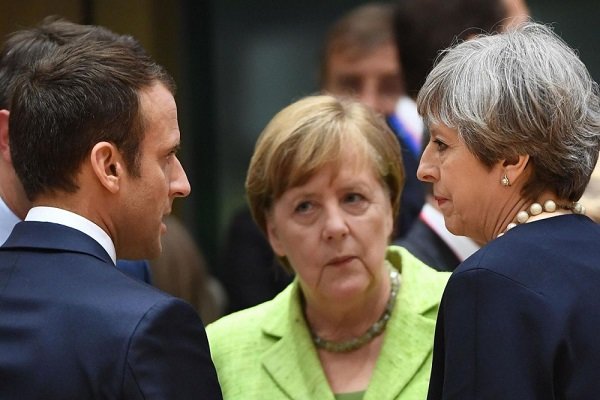Europe looks to thwart Trump’s Iran sanctions

Europe’s biggest economic powers are planning to create a “special purpose” financial company to thwart U.S. President Donald Trump’s sanctions and help Iran to continue to sell oil in the EU.
The move, by France, Germany and Britain, and supported by the EU, is likely to enrage Trump, who in May unilaterally withdrew from the Iran nuclear accord, which the Europeans, Russia and China continue to support and have pledged to do their utmost to protect.
A first battery of renewed U.S. economic sanctions took effect against Iran last month, and further sanctions — including sanctions on the Iranian oil sector, a mainstay of the country’s economy — are set to take hold in November.
While the EU has already taken steps to obstruct Trump’s sanctions — including potential penalties against firms that enforce the American sanctions without permission of the European Commission — officials in Europe still fear that the U.S. dominance of the world financial system will block most business with Iran. That would ultimately destroy the nuclear accord, known as the Joint Comprehensive Plan of Action.
Tehran itself has warned the Europeans that they should develop new ways of trading with Iran by early November if they want to preserve that nuclear deal.
U.S. officials and diplomats have warned all businesses and countries around the world to stop doing business with Iran. And the White House reacted furiously to the EU’s announcement last month of an €18 million aid package to Iran for projects in support of sustainable economic and social development.
EU officials on Friday confirmed the plan to create the so-called special purpose vehicle, which was first reported by Spiegel, the German news site.
When asked about this financing model, a spokesperson for the German finance ministry said: “The German government is working together with the EEAS and European Commission, as well as France and the United Kingdom, on maintaining financial payment channels with Iran. The negotiations on this are intensive and ongoing. There are different models under consideration.”
A French official added the EU needs “a financially independent sovereign channel” in order to keep the Iran deal alive.
News of the plan comes only two days after European Commission President Jean-Claude Juncker vowed in his final State of the Union address to increase the role of the euro in international trade, particularly in terms of energy purchases.
Word of the European plan to prop up Iran’s oil industry is certain to further damage the already badly strained transatlantic relationship.
Trump’s combative and unilateral approach on numerous policies, including his withdrawal from the Paris climate agreement, his trade tariffs, criticisms of NATO, and decision to move the U.S. Embassy in Israel to Jerusalem, have dismayed America’s most stalwart and long-standing European allies.
One EU official explained that the “special purpose vehicle” would effectively function as an accounting firm, providing a loophole to keep trade flowing between EU countries and Iran. If Italy wants to buy Iranian oil, it could wire money to the firm, which would handle the rest of the transaction. Iran, similarly, could wire money for the purchase of European products.
The special purpose vehicle would keep the money for the transactions within the EU, and outside the reach of U.S. control over global money-transfer systems. It would also avoid the need to use banks that are afraid of being cut off from doing business in the U.S. financial market if they are accused by the U.S. Treasury Department of violating the sanctions.
Crucial decisions are still to be made, the official said, including where the new firm would be established, how its ownership would be structured, and the precise sources and amounts of startup capital.
(Source: politico.eu)
